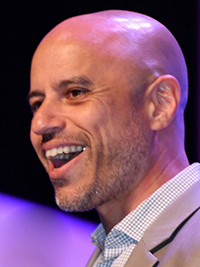ZDoggMD: How to get to healthcare 3.0
The next evolution in healthcare delivery will come when clinicians are given the tools, resources and autonomy to address the individual challenges of their patients, one YouTube celebrity told healthcare finance leaders.
Zubin Damania, MD, founder of defunct Turntable Health and a YouTube commentator, who goes by ZDoggMD and addresses the many challenges in the healthcare system, provided the Monday keynote address at the HFMA Annual Conference.
Damania used an engaging mix of music videos, which he created to explain some needed healthcare industry changes, visual depictions of challenges, personal stories and even a live song with an accompanying video to push for change in healthcare delivery.

The challenges of healthcare delivery reform were portrayed through the prism of Damania’s life, during which he, the son of two physicians, was encouraged to move beyond the traditional, small-practice primary care delivery of “healthcare 1.0.”
After entering medicine, Damania found himself in “healthcare 2.0,” which was the data-intensive model of the last decade.
But what is needed to reverse the nation’s deteriorating health and finances, Damania said, is “healthcare 3.0,” which will harness the healthcare field to help address the social determinants of health that are driving health problems.
“In this society, we medicalize our social problems to the tune of $3.2 trillion,” Damania said.
Finance meets ethics for Damania in unnecessary hospitalizations, which he described as both an economic disaster and a moral disaster.
The problem with the current data-driven approach is that it ignores the fact that people are primarily driven by their emotions and emotions do not respond to the logic of data. Instead, healthcare needs to use data to identify the causes behind patients’ health problems and then educate and motivate patients with emotionally driven appeals.
That approach has animated ZDogg’s spate of YouTube videos, which have garnered millions of views and thousands of comments.
Damania’s gauge for the efficacy of the videos, in part, is the response of his own parents, who after watching his video on end-of-life planning, decided to raise with him the long-taboo subject of death and describe their end-of-life wishes.
Damania put his health 3.0 principles into practice when he founded Turntable Health in Nevada in 2013, which contracted with the state’s CO-OP plan to provide not only comprehensive primary care to 4,000 enrollees but also began to address some of the factors driving their health.
Despite successes like cutting its patient population’s overall healthcare costs by 12%, the provider organization closed in 2017 when the CO-OP, it’s primary customer, shutdown.
But Damania said other providers, like Iora Health, have picked up the mantle of addressing the root causes of health conditions and show what is possible if payers and providers moved to healthcare 3.0.





